Franchise Model Sustainability: Building Greener, Lasting Networks
Updated On: October 23, 2025 by Aaron Connolly
Core Principles of Franchise Model Sustainability
Sustainable franchising brings together environmental responsibility with economic growth and stronger communities. These three forces combine to help franchises stick around longer and outperform old-school business models.
Defining Sustainability in Franchising
Sustainability in franchising means building businesses that succeed now without messing up the future. We look at three main things: environmental impact, social responsibility, and long-term profits.
The Three Pillars of Sustainable Franchising:
- Environmental: Cutting waste and saving energy
- Social: Supporting workers and local communities
- Economic: Keeping profits steady over time
Modern franchising isn’t just about growing as fast as possible anymore. More and more, franchise systems plan years—or even decades—ahead, not just for the next quarter.
Sustainable franchises track their impact with real numbers. They keep an eye on energy use, waste, employee happiness, and how much they put back into the community, on top of the usual profit checks.
This approach draws in eco-conscious customers. Apparently, about 73% of shoppers lean toward brands that show real environmental values.
Integrating Environmental Responsibility
Environmental responsibility in franchising really starts with using fewer resources at every location. We roll out energy-saving systems, sustainable supply chains, and programs to cut down on waste.
Key Environmental Practices:
- Renewable Energy: Solar panels, green electricity deals
- Waste Management: Recycling and less packaging
- Supply Chain: Local sourcing, eco-friendly suppliers
- Water Conservation: Low-flow fixtures, rainwater collection
Training makes a huge difference here. Franchisors give clear guides and keep supporting franchisees as they switch to greener ways of working.
Plenty of franchises actually save money by going green. Energy-efficient gear can drop utility bills by 15-30% a year. Cutting waste also slashes disposal costs.
Green certifications help franchises stand out. Programs like BREEAM or LEED set standards that customers recognize and trust.
Economic and Social Dimensions
Economic sustainability means franchises stay profitable while helping their communities. We try to balance short-term spending with long-term benefits by planning carefully and growing responsibly.
Economic Benefits of Sustainability:
- Cost Savings: Lower bills for energy and waste
- Premium Pricing: Eco-friendly customers pay a bit more—sometimes 10-15%
- Risk Reduction: Better prepared for new environmental rules
- Brand Value: Stronger reputation pulls in better franchisees
Social responsibility is all about fair jobs and supporting the community. Sustainable franchises pay living wages, offer career paths, and give people flexible work options.
Getting involved locally makes a difference. We support local charities, sponsor events, and buy from nearby suppliers when we can.
Employees stick around longer if they’re proud of their workplace. In fact, people stay 40% longer when they believe in the company’s values and environmental work.
Strong relationships between franchisors and franchisees build the backbone of sustainable systems. Regular chats, shared goals, and helping each other out make a network that lasts.
Essential Elements of Sustainable Franchise Models

If you want a sustainable franchise to work, you need three things: a solid system structure, smart growth strategies, and clear ways to measure what’s working.
Franchise System Structure
A sustainable franchise system sets up clear rules and support for everyone. The franchisor gives training, marketing help, and ongoing support to the franchisees.
The best systems keep things simple. They hand out detailed manuals and keep training fresh with regular updates. That keeps quality up everywhere.
Good communication is key. Franchisors check in with franchisees regularly to fix problems fast. Monthly business reviews and quarterly training keep everyone on track.
Financial transparency matters. Franchisees need to know all the costs upfront, like:
- Initial franchise fees
- Ongoing royalty payments
- Marketing fund contributions
- Equipment and supplies
Territory rights need to be clear too. Every franchisee should know their protected area and where they can grow. That keeps things fair.
Sustainable Growth Strategies
Smart growth isn’t about speed—it’s about quality. We suggest franchisors only expand when current locations are profitable and well-supported.
Franchisors should pick franchisees who share their values and have the right experience. Operational excellence comes from choosing the right people, not just anyone with cash.
Market research is vital. Understanding local people, competitors, and the economy helps predict if a new spot will work. Don’t open in a new area unless there’s proven demand.
Multi-unit deals make sense for experienced franchisees. They can open several locations over time, which saves money and builds a stronger presence.
Franchise systems need to adapt as things change, but keep their core values. That might mean new tech, extra products, or different store layouts.
Franchisors and franchisees should collaborate to innovate. Testing new ideas in a few spots first lowers risk before rolling them out everywhere.
Sustainability Goals and Measurement
Setting clear sustainability goals helps franchises see progress and stay accountable. We recommend setting specific targets for the environment, social good, and finances.
Environmental goals might be:
- Use 20% less energy in three years
- Cut waste by 15% each year
- Buy half of materials locally
Social targets could focus on community work, happy employees, and ethical sourcing.
Key performance indicators get tracked monthly. These might be sales per location, customer satisfaction, or franchisee profits.
Regular reports keep everyone in the loop. Quarterly sustainability reports show what’s working and what needs tweaking. That kind of openness builds trust with both franchisees and customers.
Benchmarking against others in the industry helps spot areas to improve. Franchises can learn from competitors and borrow good ideas.
Reward franchisees who hit their sustainability goals. Maybe offer lower royalties, more marketing help, or special recognition.
The Role of Franchisees and Franchisors in Sustainability
Franchisees and franchisors both need to step up if they want a sustainable system. This means clear roles, strong leadership, and open conversations between everyone.
Responsibilities of Franchisees
Franchisees really make sustainability happen on the ground. They run the day-to-day business where most of the environmental impact occurs.
Daily Operations Management
- Switch to LED lights and efficient equipment to save energy
- Set up recycling and waste sorting
- Buy from local suppliers to cut down on transport emissions
- Train staff in eco-friendly habits
Customer Engagement
Franchisees can talk to customers about making greener choices. Maybe offer a discount for reusable cups or highlight plant-based menu items.
Cost Management
Smart franchisees keep an eye on what they spend for sustainability. Energy-efficient equipment costs more at first but saves money over time.
Brand Standards Compliance
Following the franchisor’s green guidelines keeps standards high everywhere. That builds customer trust in the brand’s environmental promises.
Leadership by Franchisors
Franchisors lead the way by setting standards and offering support. Their choices affect a lot of locations.
Creating Sustainability Standards
Franchisors set environmental rules for everyone. These might cover energy targets, approved suppliers, or waste goals.
Financial Support and Incentives
- Offer grants or loans for green equipment
- Negotiate bulk deals for sustainable products
- Give rebates to franchisees who beat environmental targets
Training and Resources
Franchisors build training programs that teach franchisees to go green. They share good ideas from top-performing locations.
Monitoring and Reporting
Regular audits keep track of how well the network is doing. Franchisors spot who’s leading and who needs a hand.
Open Communication and Collaboration
Good communication makes sustainability work better. Both franchisors and franchisees can learn from each other.
Regular Feedback Sessions
Monthly or quarterly meetings let franchisees share what’s working locally. Franchisors use this feedback to improve programs.
Shared Learning Networks
Forums or groups where franchisees swap tips create a helpful culture. Top locations can mentor others.
Problem-Solving Together
When challenges pop up, franchisors and franchisees team up to fix them. Maybe they need to tweak policies for local rules or customer habits.
Transparency in Results
Sharing sustainability numbers across the network lets everyone see their impact. Franchisees can check how their efforts help the bigger picture.
Eco-Friendly Practices in Franchise Operations
Modern franchises can save money and win over conscious customers with three main environmental moves. Smart waste management, responsible sourcing, and cutting carbon all add up to real business benefits and a healthier planet.
Waste Reduction and Recycling
Good waste reduction starts with tracking what gets tossed each week. Most franchises waste 20-30% of their materials because of bad planning or old systems.
Digital-first operations cut down on paper waste a lot. Use email receipts, tablets for training, and digital storage for customer data.
Food waste solutions are a must for restaurants. Try portion control, donate unsold food, or use apps to sell leftovers at a discount.
Recycling programs work best with clear steps:
- Separate bins for different stuff
- Staff training on sorting
- Regular pickups
- Team up with local recycling centers
Track your waste every month. Franchises often cut waste by 40-50% in the first year with these steps.
Sustainable Sourcing
Local supplier partnerships lower transport costs and help the local economy. Try to buy ingredients or supplies within 50 miles if you can.
Pick suppliers who actually care about the environment:
- Certified organic or fair-trade products
- Minimal packaging
- Use renewable energy
- Open about their supply chain
Bulk buying cuts packaging and delivery trips. Order non-perishables in bigger amounts every few months. Share orders with nearby franchisees to save more.
Quality over quantity pays off. Better materials last longer and need replacing less often, which means less waste and lower costs in the long run.
Sustainable sourcing might bump up initial costs by 10-15%, but overall you save on waste and build stronger supplier ties.
Minimising Carbon Footprint
Energy efficiency upgrades pay off quickly. LED lighting can cut electric bills by 60-80%. Smart thermostats adjust heating and cooling automatically.
Transport optimization saves fuel and emissions:
- Plan delivery routes smartly
- Combine stops
- Use hybrid or electric vehicles if possible
- Encourage carpooling or public transit for staff
Renewable energy options work for lots of locations. Solar panels usually pay for themselves in 5-7 years in the UK. Small wind turbines fit rural spots with steady wind.
Carbon tracking tools help you see progress:
- Check monthly utility bills
- Track fuel use
- Record waste disposal
- Survey employee commutes
Many franchises shrink their carbon footprint by 30-40% in just two years with these steps.
Transitioning to Renewable and Clean Energy
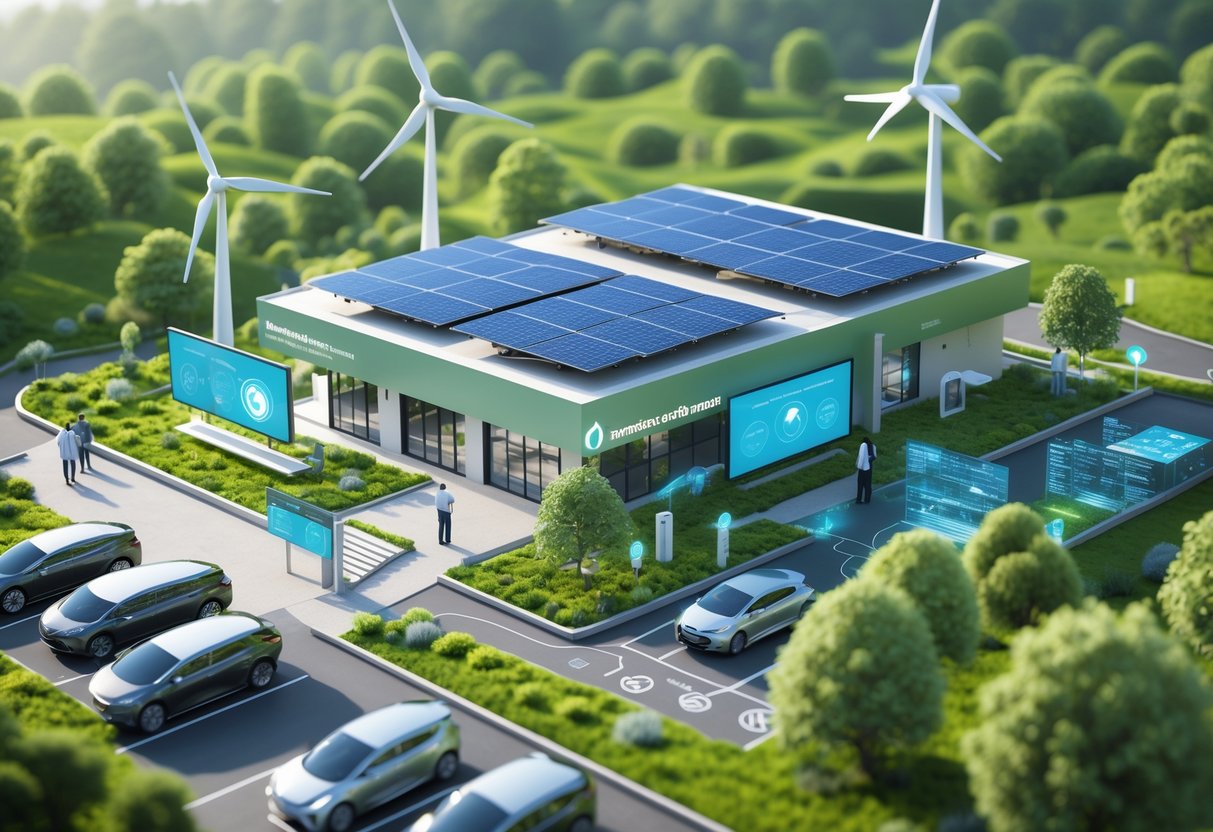
Energy use makes up one of the biggest environmental impacts for franchises. Installing solar panels and wind systems can slash carbon emissions by up to 70% and lower operating costs over time.
Adopting Renewable Energy
Switching from traditional energy sources to renewable alternatives can dramatically shrink our franchise’s environmental footprint. Sure, solar and wind systems cost more upfront, but they save a lot over time.
Financial Benefits
- Lower monthly electricity bills
- Government tax incentives and grants
- Protection from rising energy prices
- Increased property values
Most franchises kick things off with solar panel installations on rooftops or car parks. A typical restaurant needs about 20-30 panels, with an initial outlay of £8,000-£15,000. Usually, these systems pay for themselves in 7-10 years.
If installing our own systems just isn’t possible, we can buy renewable energy certificates. This way, we still support clean energy generation and offset our carbon footprint.
Implementation Steps:
- Conduct energy audits at each location
- Research local renewable energy providers
- Compare installation costs with buying green energy
- Start with high-energy locations first
Implementing Wind and Solar Solutions
Solar installations work best if a franchise has enough roof space and gets good sun. South-facing roofs with little shade are ideal.
Solar System Requirements:
- Roof condition assessment
- Planning permission (if needed)
- Grid connection setup
- Maintenance contracts
Franchises in rural or coastal spots may prefer wind energy, especially if the wind is reliable. Small wind turbines can complement solar systems nicely.
Wind Energy Considerations:
- Local wind speed data
- Noise regulations
- Visual impact assessments
- Higher maintenance needs
Some franchises mix both technologies for steadier energy generation year-round.
Monitoring Systems Modern renewable setups come with smart monitoring that tracks energy production and usage. This helps us spot peak consumption times and tweak operations.
We keep things running well with regular maintenance. Solar panels need cleaning every few months, and wind turbines should get professional servicing each year.
Training and Support for Franchise Sustainability
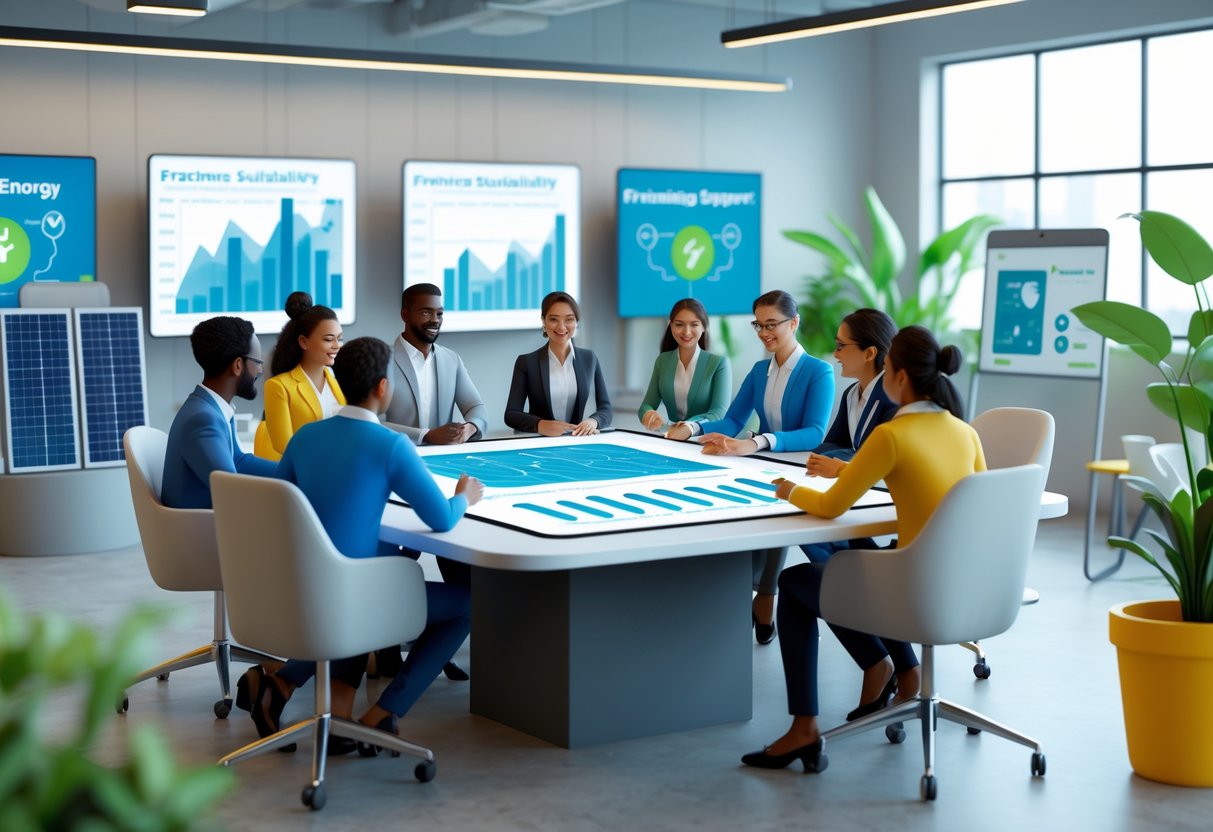
Successful sustainability depends on comprehensive training that teaches franchisees green practices from day one. We need ongoing education and practical guidance so franchisees can actually put eco-friendly practices into action.
Training Programmes for Franchisees
Most franchises miss the mark on sustainability because they don’t train franchisees well at the start. We need structured programmes that cover energy efficiency, waste reduction, and sustainable supply chain management.
Essential Training Components:
- Operating and maintaining energy-efficient equipment
- Sorting and recycling waste
- Choosing sustainable suppliers
- Meeting green certification requirements
- Saving money through eco-friendly practices
New franchisees should finish sustainability training within their first 30 days. This training has to be hands-on and practical, not just theory.
A phased approach works well for many franchises. Week one focuses on energy conservation basics. Week two covers waste management. Week three introduces sustainable sourcing.
Customised training materials help each location. Urban stores might need more on recycling. Rural franchises should focus on energy conservation and local sourcing.
Training Methods That Work:
- Interactive workshops with real equipment
- Shadowing experienced sustainable franchisees
- Online modules with practical tasks
- Regular competency checks
Ongoing Training and Education
Sustainability keeps evolving. We’ve got to offer continuous learning so franchisees stay up to date on new tech and rules.
Monthly webinars are great for sharing new green practices across the network. These should spotlight franchisees who share wins and struggles.
Effective Ongoing Education Formats:
- Quarterly sustainability newsletters
- Peer-to-peer learning sessions
- Annual green practice conferences
- Digital resource libraries with updated guides
Franchises thrive with sustainability champions—experienced franchisees who mentor others. These champions get advanced training and help new locations tackle challenges.
Franchisees need regular updates on environmental regulations. They should always know about new recycling rules, energy standards, or waste disposal requirements in their area.
Operational Guidance for Green Practices
Franchisees need step-by-step guides for making sustainability part of daily operations. Vague goals don’t cut it—we need clear procedures.
Daily Operations Checklist:
- Morning energy audit routines
- Waste separation during busy times
- Verifying supplier sustainability with deliveries
- Engaging customers in green initiatives
- End-of-day conservation routines
Visual guides and checklists help staff keep up, especially in fast-paced settings. Laminated cards with recycling symbols and energy-saving tips go a long way.
Support Tools Franchisees Need:
| Tool Type | Purpose | Frequency |
|---|---|---|
| Energy monitoring apps | Track consumption | Daily |
| Waste audit templates | Measure reduction | Weekly |
| Supplier scorecards | Evaluate sustainability | Monthly |
| Cost tracking sheets | Monitor savings | Monthly |
Monthly operational reviews catch issues before they grow. We check in regularly to help franchisees with any green practice challenges.
Engaging Customers and Building Brand Loyalty
Sustainable practices help franchises connect with customers who care about the planet. We see franchises building real loyalty by rewarding green choices and sharing honest stories about their environmental impact.
Loyalty Programmes with Sustainable Benefits
Most loyalty schemes just hand out discounts or points. Sustainable loyalty programmes reward choices that match customers’ environmental values.
Try offering discounts when customers bring their own containers or cups. This rewards eco-friendly actions and cuts your packaging costs.
Popular sustainable loyalty rewards include:
- 10% off for bringing your own container
- Free items for joining recycling drives
- Bonus points for picking plant-based menu items
- Early access to limited eco-friendly products
Digital loyalty apps make it easy to track green actions. Customers can see how much waste they’ve saved or how many containers they’ve reused.
Some franchises link up with environmental charities. After 10 visits, they’ll donate to tree-planting or ocean cleanup in the customer’s name.
Brand Identity in Green Franchising
If customers don’t know about your sustainable practices, they won’t matter. We have to communicate our efforts clearly—without sounding fake.
Share your real achievements, not just promises. Instead of saying, “we care about the environment,” say, “we cut single-use packaging by 40% this year.”
Effective green branding includes:
- Clear messaging about what you’ve actually done
- Visual cues like recycling symbols and green colours
- Staff training so employees can talk about sustainability with customers
- Social media posts that show behind-the-scenes green efforts
Customers want honesty, not perfection. They appreciate franchises that admit the journey is ongoing but show they’re making real progress.
Customer Loyalty Through Sustainability
Younger customers especially pick brands that share their values. Sustainable practices build emotional ties and keep people coming back.
We notice that customers become advocates when they feel part of your mission. They post about you online and tell friends to check you out.
Key loyalty drivers include:
- Transparency about sourcing and supply chain
- Updates on environmental progress
- Chances for customers to join green initiatives
- Recognition for customer contributions to sustainability
Research says 73% of customers will pay more for sustainable brands. This loyalty boosts customer lifetime value and cuts down what you spend bringing in new customers.
Community engagement makes this even stronger. Franchises that sponsor local green events or work with schools on recycling build real neighbourhood connections.
Community Engagement and Local Impact
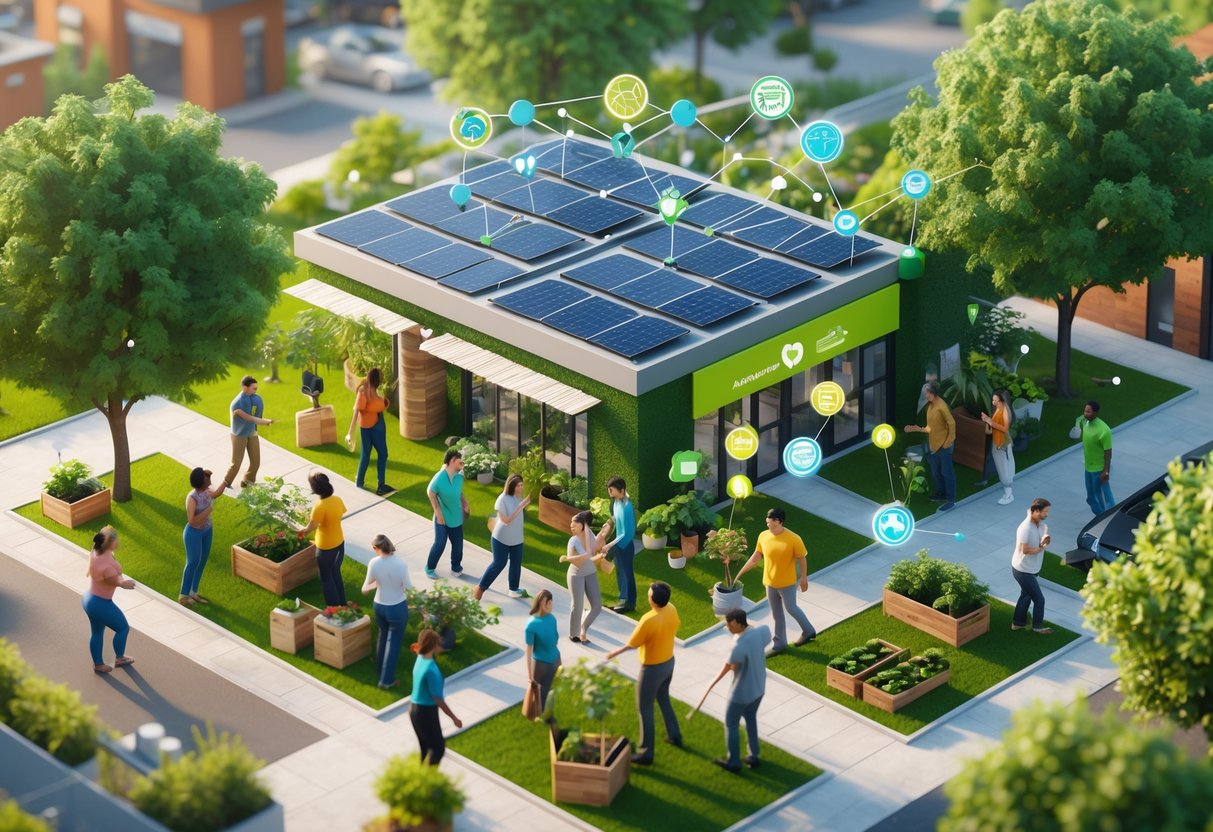
Franchises build real trust when they get involved in their communities and form local partnerships. These efforts show customers you care and help support the places you do business.
Involving Franchisees in Community Initiatives
Franchisees represent the brand in their neighbourhoods. When they join community events or support local causes, customers see genuine care—not just another marketing ploy.
The best approach focuses on locally relevant initiatives. Maybe a franchise owner sponsors a youth sports team or helps with a school fundraiser. These actions mean more because franchisees live in the same area as their customers.
We can offer franchisees flexible programmes that fit local needs. Some places need food bank support. Others might benefit from education or environmental clean-up events.
Being present matters a lot. Franchisees who can visit all their locations regularly usually perform better than those managing outlets from far away. Staying close helps owners understand and quickly respond to local needs.
Key benefits include:
- Stronger customer loyalty
- Positive brand reputation
- Increased local sales
- Better staff retention
Strengthening Local Partnerships
Smart franchises team up with local groups, schools, and non-profits. These partnerships create real value beyond just sponsorships.
We should look for partners that share our brand’s values. A tutoring franchise might work with local schools. A fitness brand could team up with sports clubs or health organisations.
Effective partnerships usually involve:
- Sharing resources and expertise
- Joint events and programmes
- Cross-promotion
- Long-term commitment to community goals
Local partners offer great feedback on what the community really needs. Non-profits know their areas inside out and can help franchise owners focus on what matters most.
The best partnerships last over time, not just for one-off donations. Regular collaboration builds trust and shows you’re truly invested in community wellbeing. This turns franchises into valued neighbours, not just businesses.
Innovation and Digital Transformation
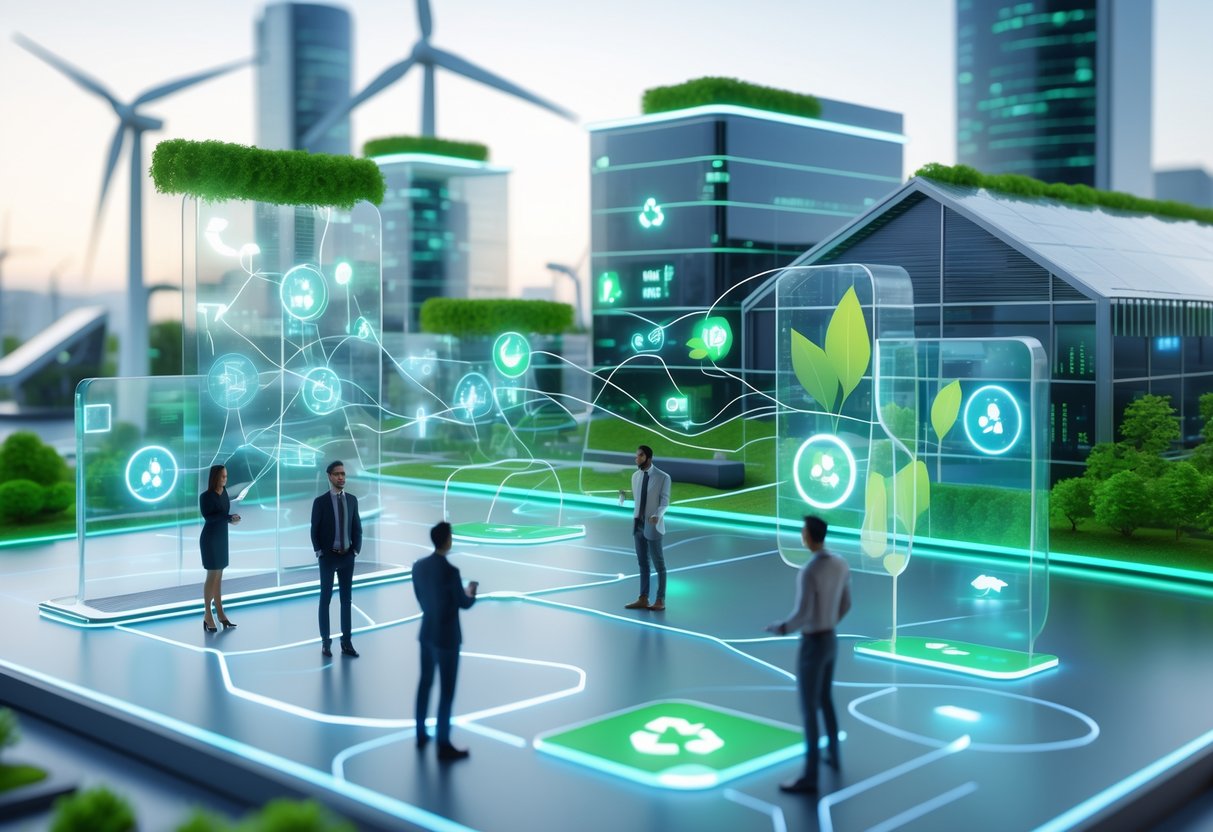
Digital tech is shaking up how franchise businesses handle sustainability. New tools now let us track environmental impact and find eco-friendly solutions. Franchises are using data analytics, automation, and smart systems to cut waste and manage resources better.
Digital Tools for Sustainability
Franchises are jumping into digital platforms that monitor and improve environmental performance. These tools provide real-time insights so owners can make smarter choices.
Predictive Analytics for Resource Management Franchises use data to predict demand more accurately. For example, a coffee shop chain might review past sales to order the right amount of supplies, cutting food waste by up to 20%. This avoids overstocking and keeps customers happy.
Smart Energy Systems Internet of Things (IoT) devices help track energy use across all locations. Smart thermostats adjust heating and cooling automatically based on how busy things get. Many retail franchises see 15-25% lower energy bills after installing these systems.
Supply Chain Transparency Platforms Blockchain tech lets franchises trace products from source to customer. A clothing franchise can check that materials come from sustainable suppliers. This transparency earns customer trust and ensures ethical sourcing.
Innovative Eco-Friendly Solutions
Digital platforms help franchises quickly develop and test new sustainable products and services. We’re seeing creative ideas that help both the environment and business.
Circular Economy Apps Some franchises now reward sustainable customer behaviour with digital perks. A beauty chain might give loyalty points for returning empty containers. These programmes encourage repeat visits and cut down packaging waste.
Virtual Service Delivery Fitness franchises have started offering online classes through subscriptions, reaching more people without adding new physical locations. One chain grew membership by 40% after launching virtual services.
Automated Waste Management Smart bins with sensors alert staff when they need emptying, making waste collection more efficient. Restaurant franchises using these systems report 30% fewer waste collection trips, saving fuel and money.
Evaluating Sustainable Franchise Opportunities
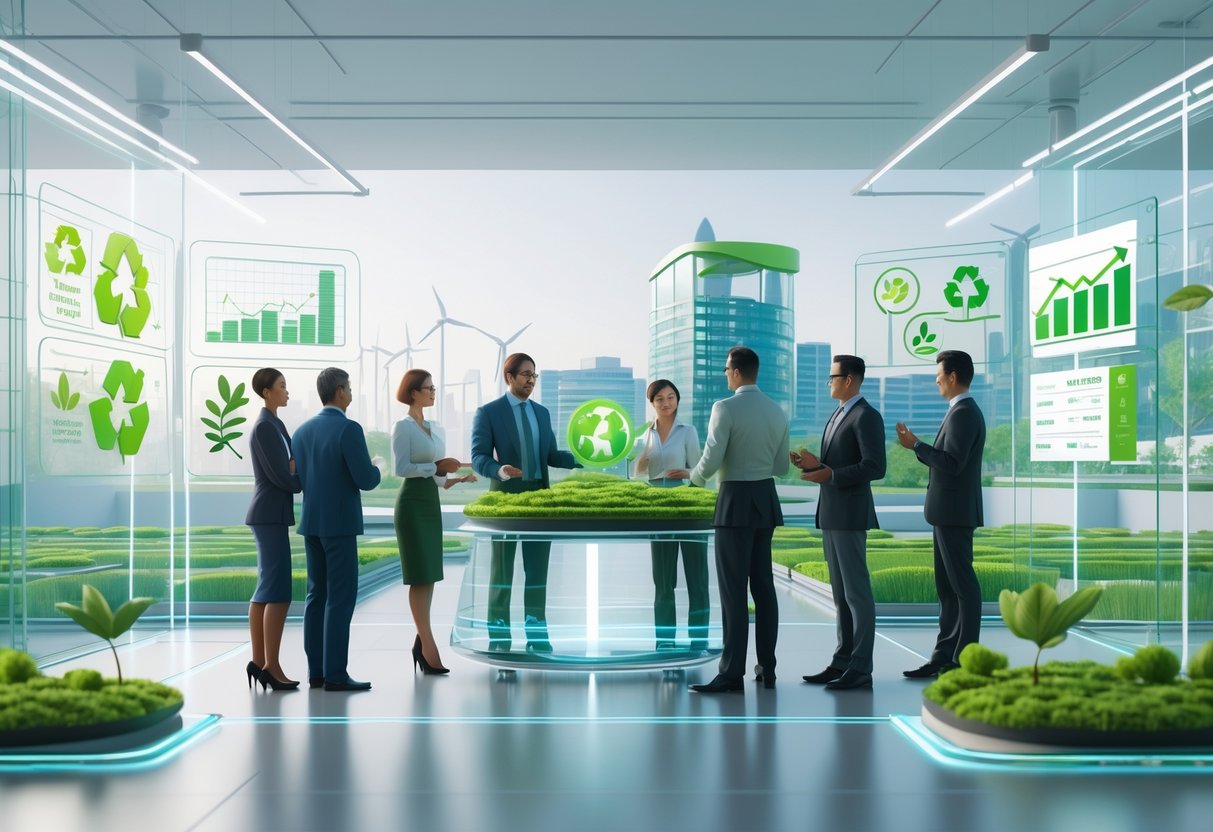
Choosing a sustainable franchise takes careful research into industry trends and eco-friendly business models. We have to look at both market signals and environmental practices to make smart investments.
Assessing Franchise News and Trends
Market research is the backbone of smart franchise decisions. We should keep an eye on franchise news to spot new sustainability trends.
Industry publications highlight which franchises invest in green tech. Look for companies adopting renewable energy, waste reduction, and carbon-neutral operations.
Consumer demand data reveals a growing preference for eco-conscious brands. Franchises that report higher sales from sustainability efforts show strong market potential.
Financial performance matters too. Compare revenue growth between traditional and sustainable franchises in the same sector.
| Trend Indicator | What to Look For |
|---|---|
| Energy initiatives | Solar panels, LED lighting, smart systems |
| Waste management | Recycling programmes, compostable packaging |
| Supply chain | Local sourcing, sustainable materials |
| Customer response | Sales growth, loyalty increases |
Keep an eye out for franchise opportunities that match up with government sustainability incentives. These often come with tax breaks and grant funding.
Identifying Eco-Friendly Franchise Options
Green franchise sectors keep popping up across all sorts of industries. Food and beverage franchises, for example, are out front with plant-based menus and eco-friendly packaging.
Cleaning services that use non-toxic products draw in customers who care about the environment. Fitness franchises are getting creative too, using outdoor spaces and energy-saving equipment—they’re seeing real growth.
You’ll want to check out the franchisor’s environmental policies. Ask for their sustainability reports and see if they’ve got any clear timelines for putting those ideas into action.
Find out if franchisees actually get training on eco-friendly practices. The best green franchises don’t just talk—they offer ongoing support for environmental efforts.
Brand reputation in the sustainability world really matters for long-term success. Hunt down customer reviews that mention environmental efforts and community impact.
Certifications like B-Corp status or other industry standards help prove a brand’s real commitment, not just marketing fluff.
Think about what it’ll actually cost to run things sustainably. A lot of eco-friendly systems end up cutting utility and waste costs over time.
Local market acceptance isn’t the same everywhere. Urban areas usually jump on sustainable businesses faster than rural ones.
Industry Leaders and Global Trends in Sustainable Franchising

Big franchise brands in food, retail, and services are raising the bar for environmental responsibility. At the same time, international standards and local approaches are shaping how franchise systems roll out sustainability on a global scale.
Sector Guides: Food, Retail, and Services
Food franchises are leading the way with big sustainability pushes in packaging, sourcing, and waste. McDonald’s plans to use only renewable packaging by 2025. Over at Subway, they’re working with local suppliers to cut transport emissions.
Retail franchises are doubling down on circular economy ideas and energy savings. The Body Shop centers its franchise model on ethical sourcing and refillable packaging. 7-Eleven has switched to LED lighting and smart cooling in thousands of stores.
Service franchises are getting greener by going digital and optimizing resources. Molly Maid uses eco-friendly cleaning products and digital schedules to cut travel emissions. Anytime Fitness fits new locations with energy-saving equipment and solar panels.
Key Implementation Areas:
- Waste reduction: Compostable packaging, food donation programs
- Energy efficiency: Smart thermostats, renewable energy
- Supply chain: Local sourcing, ethical procurement
- Digital transformation: Paperless operations, mobile ordering
International Standards and Regional Approaches
Global frameworks like the UN Global Compact and B Corp certification give franchises a playbook for measuring and improving environmental impact. These standards help franchises stay profitable while pushing for real sustainability.
Regional rules shape how franchises put these ideas into practice. In Europe, franchises need to follow strict EU Taxonomy guidelines for sustainability. The UK’s Net Zero goals are pushing franchises to go carbon-neutral by 2050.
In North America, franchises often chase LEED certification for buildings and Energy Star equipment. Asian markets focus on waste and water savings, especially in crowded cities where resources are tight.
Regional Focus Areas:
- Europe: Cutting carbon footprints, circular economy
- North America: Building efficiency, renewable energy
- Asia-Pacific: Water conservation, waste-to-energy
- Emerging markets: Community development, local jobs
Franchise systems are starting to use integrated reporting—combining financial, environmental, and social data. This gives stakeholders more transparency and pushes for steady improvement.
Frequently Asked Questions

People have a lot of questions about franchise sustainability—costs, training needs, and long-term payoffs. Here’s what comes up most for franchisors and franchisees trying to go green.
How can a franchise ensure long-term environmental sustainability in its operations?
Start with a thorough environmental audit at every franchise. That’ll show you where you use the most energy, create waste, or use water.
Set real targets for each spot. Maybe cut energy use by 20% in two years or ditch single-use plastics by a set date.
Put in energy-saving gear everywhere. LED lights, smart thermostats, and Energy Star appliances can cut costs and shrink your footprint.
Switch to renewable energy if you can. Solar panels or green energy contracts make a big difference over time.
Track your progress with monitoring software. Measure energy, waste, and emissions every month so you know what’s working.
What are effective strategies for franchises to engage in social responsibility?
Team up with local charities and organizations in each community. That builds real connections and backs causes your customers care about.
Pay fair wages and offer solid benefits to every employee. Happy staff stick around, and it shows you care about social responsibility.
Buy from suppliers who treat workers right. That way, your franchise supports good practices all the way up the supply chain.
Start community programs—job training, workshops, or neighborhood clean-ups. These efforts build goodwill and give back locally.
Write up diversity and inclusion policies for hiring and promotions. Make sure your team reflects the people you serve.
In what ways can a franchise model contribute to sustainable local economic development?
Choose local suppliers for food, materials, and services. That keeps money nearby and cuts down on transport emissions.
Hire management and staff from the local area. It creates jobs and roots your franchise in the community.
Work with local farmers and producers for ingredients. That supports regional agriculture and keeps your supply chain greener.
Invest in things like bike racks, EV charging stations, or community gardens. These upgrades help the whole neighborhood.
Sponsor or join local events and festivals. It’s a great way to show commitment and get involved.
What practices should a franchise adopt to manage resources efficiently and reduce waste?
Roll out a solid recycling program in every location. Use clear bins and make sure staff know how to sort waste.
Switch to digital receipts, menus, and ordering. You’ll save a ton of paper and make things easier for customers.
Donate unsold food to food banks or charities. It cuts waste and helps people in need.
Buy in bulk and use refillable containers to shrink packaging waste. Ask suppliers for reusable or minimal packaging.
Install low-flow taps and toilets. These simple fixes can drop your water use by 20–30% a year.
How important is sustainability training for franchise employees, and what does it involve?
Sustainability training matters—a lot. Employees are the ones who actually carry out eco-friendly practices day-to-day.
Start with basics like waste sorting, saving energy, and resource management. Show staff how to use recycling and energy-efficient gear properly.
Train managers to spot wasteful habits and fix them fast. Leadership on the ground makes all the difference.
Do refresher sessions every quarter. That way, everyone stays up to date and new ideas get shared.
Offer rewards for locations or people who really shine on sustainability. A little recognition goes a long way.
Can you suggest any frameworks or certifications for franchises striving for sustainability?
You might want to look at B Corp certification—it’s a pretty well-known sustainability standard for businesses. It digs into things like environmental impact, community benefit, and ethical governance.
ISO 14001 is another one to consider, especially if you’re focused on environmental management systems. Franchises use this standard to build better, more systematic ways to cut down on their environmental footprint.
LEED certification is all about your franchise’s buildings and facilities. If you’re interested in energy efficiency, water conservation, or using sustainable materials, LEED is a solid option.
The Carbon Trust Standard lets franchises track and cut their carbon emissions. Earning this certification shows you’re serious about climate action.
Local environmental certifications can be a bit of a mixed bag, depending on where you operate. Still, they often offer valuable recognition in your community. It’s worth checking which programs are available in your franchise area—they can add some extra credibility.

